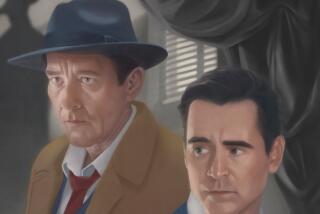Jean-Pierre Melvilleâs âTwo Men in Manhattanâ reaches U.S. fans
American culture was more than a fascination for Jean-Pierre Melville; it was a defining component of the French directorâs persona and lifeâs work. There was the surname he adopted, the Stetson hats he favored, the Cadillac he piloted through the streets of Paris. Above all, there was the hard-boiled sensibility of gangster movies from the 1930s and â40s, an attitude he polished into a new cinematic minimalism, bone-cold and bittersweet.
Melville got to exercise his vision stateside only twice. Among his 13 features, none was shot entirely on U.S. soil. The closest he came to a full-blooded American production was âDeux Hommes Dans Manhattanâ (âTwo Men in Manhattanâ), a jazz-infused nocturne in which the director, in his only starring role, plays a journalist on a quest thatâs not quite credible but always intriguing. (His most indelible bit part is the author who holds court with young reporters in Jean-Luc Godardâs âBreathless.â)
In a filmography that includes such triumphs as âLe SamouraĂŻ,â âLe Cercle Rougeâ and âArmy of Shadowsâ â all greeted rapturously by critics in their recently restored versions â âTwo Menâ is, without question, a lesser work. But though it lacks the urgency of Melvilleâs better-known films, his mastery of mood, informed by his singular synthesis of Gallic existentialism and B-movie grit, invigorates every frame.
SNEAKS: Movie trailers, full coverage
The feature was never released theatrically in the U.S., but in recent months a digitally remastered edition from Cohen Film Collection has been featured on a select number of big screens, including one at the Los Angeles Film Festival in June. It makes its home-video debut Tuesday on Blu-ray and DVD.
The New Wave was in its infancy when âTwo Menâ hit French theaters in 1959. Melvilleâs previous outing, the wry crime saga âBob le Flambeurâ (âThe Good Thiefâ), had been an inspiration to the writers and would-be filmmakers of the Cahiers du Cinema, but although heâs often considered a mentor to the Nouvelle Vague, Godard in particular, Melville disavowed such labels and never aligned himself with any school. Denied union entrance to Franceâs studio system as a young man, he worked outside it for a quarter-century.
âTwo Men,â his fifth film and worst box-office flop, marked a turning point in a career whose influence remains vital long after his death in 1973, at age 55. Never again would he populate his movies with relative unknowns. Reaching beyond the art house, Melville revved up to the marquee clout of bona fide stars, key among them Alain Delon and Jean-Paul Belmondo. He would also work with Catherine Deneuve, Simone Signoret and Emmanuelle Riva, but his noir cinemascape is by and large a manâs world.
PHOTOS: Fall movie sneaks 2013
Itâs a place where loyalty and betrayal are as linked as day and night. In his best-known features, questions of morality and professional ethics play out within criminal enterprises or during wartime. âTwo Menâ stands out for its focus on journalism as a testing ground for the human soul.
Melville plays Agence France-Presse correspondent Moreau, whose natty bow tie canât disguise his mournful hangdog gaze. Heâs paired with a second protagonist, or antihero: another Frenchman working in New York, whom he enlists to help him find a missing U.N. delegate. The alcoholic news photographer Delmas is as well acquainted as Moreau with the cityâs back alleys and boĂŽtes, but they differ when it comes to the matter of scruples, a word that Delmas spits out with every ounce of derision he can muster.
As they press through the American night and its netherworld, the film subtly, brilliantly shifts focus from Moreau to Delmas, with Pierre Grasset capturing everything thatâs despicable, captivating and heartbreaking in the man.
PHOTOS: Hollywood backlot moments
Aesthetically, the feature is split quite clearly between documentary-style location work and the studio-bound, France-shot interiors, which are all a bit off in terms of believability, as are many of the supporting performances. Apartments, offices, burlesque halls and an utterly implausible Roosevelt Hospital â with the exception of an all-night diner (modeled lovingly after the one in John Hustonâs âAsphalt Jungleâ â the indoor settings donât jibe with the vibrant immediacy of the city scenes. But then, Melvilleâs meticulously pared-down stories are always fantasies first. âI am careful,â he said, ânever to be realistic.â
A heightened reality of New York emerges in âTwo Men,â propelled by the sultry jazz score by big-band leader Christian Chevallier and Martial Solal, the composer of the music for âBreathless.â The cinematographyâs black-and-white spectrum stretches from high-contrast dazzle in Times Square to the meditative grays of Pike Slip at dawn. In the depths of dusk, thereâs an achingly melancholy view of the East River, beside it the U.N. building with its reflective skin â one more loner in Melvilleâs universe of loners, and a far cry from the bustling depiction of the United Nations in another 1959 release, Hitchcockâs âNorth by Northwest.â
If the two distinct methods of filmmaking donât mesh seamlessly in Melvilleâs paean to Manhattan, they suit the duality at the movieâs core: two men, two continents. Moreau and Delmas are outsiders who have reached different levels of comfort with American materialism, and they respond differently when, at a turning point in the plot, theyâre confronted head-on with old-world notions of honor.
The movie is no thriller in the conventional sense; the mystery barely simmers. The missing man is nothing more than a MacGuffin, until his wartime heroism takes center stage, pushing aside self-conscious modernity for something heartfelt â a tip of the Stetson to the French Resistance, in whose ranks Jean-Pierre Grumbach, an Alsatian Jew, took the name of the American novelist Melville as his alias.
More to Read
Only good movies
Get the Indie Focus newsletter, Mark Olsen's weekly guide to the world of cinema.
You may occasionally receive promotional content from the Los Angeles Times.










